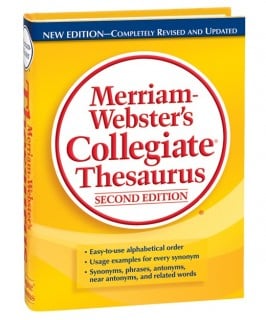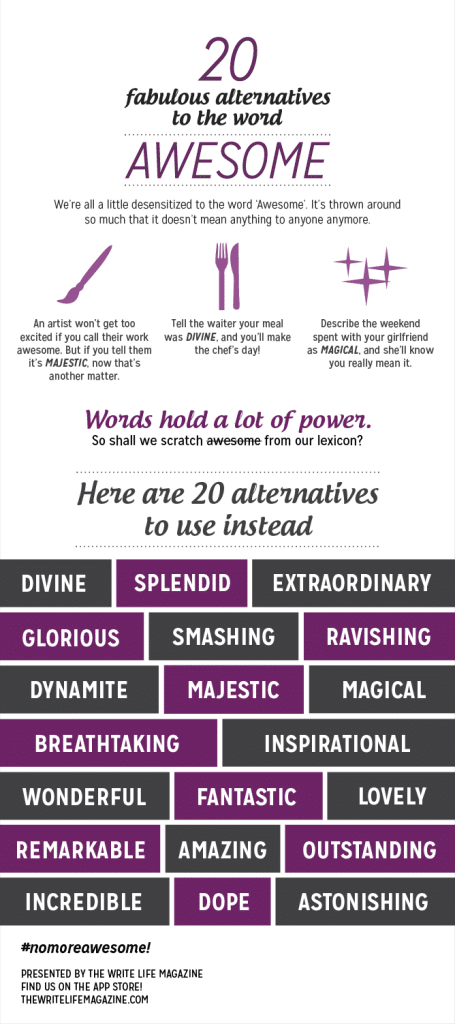 I've recently discovered that whenever I think something is great or fantastic, and it's worth commenting on how great or fantastic it is, I default to the exact same word in every conversation. It's “awesome”. Everything is awesome.
I've recently discovered that whenever I think something is great or fantastic, and it's worth commenting on how great or fantastic it is, I default to the exact same word in every conversation. It's “awesome”. Everything is awesome.
If it's funny, it's awesome. If it's pretty, it's awesome. If it makes you think, it's awesome. If it's a weird random fact, it's awesome. It's funny because most of the time, I speak in SAT words.
Using a Thesaurus Can Be Dangerous
Sometimes you might run across this problem in your writing. You find yourself using the same word or series of words over and over and over again, but not in a way that is intentional, or part of a repetition strategy. If this becomes a pattern, you want to make sure to expand your vocabulary and mix up your word choices. However, there is a right way and a wrong way to go about this.
The easiest way to find a new word for what you're trying to express is to go straight to a thesaurus (or Google, since real, bound thesauruses are practically extinct) and look up the word you're looking to replace. If you're opting for this mode of word replacement, be sure you're checking the connotation of your new word, because there is a world of difference between someone who is scrawny and someone who is slender.
If You Decide to Use a Thesaurus
Another thing that's important to know before you go picking every word out of the thesaurus is the formality of your storytelling. If you've adopted a casual writing style and throw slang words in the narration every couple pages, maybe it's not the best time to start using words that haven't been past your lips since your last high school vocabulary test. Similarly, if every other word in your prose has an extensive Latin or Greek origin, maybe “ain't” isn't the best choice of negatives for you. Match the word to the tone.
Lastly, make sure you consider the personality and background of the characters you're writing. The more educated a character is, the more extensive their vocabulary is likely to be, and children have a much more limited vocabulary than adults. A five-year-old isn't likely to use the word “vitriolic” in everyday conversation, and a neuroscience postdoc will probably come up with better words than “awesome” to describe something they approve of.
Keep in mind that sometimes using repetition in your word choice can be a good thing if you're trying to make a specific point or draw the reader's attention to something, but there's also a reason that so many people know the phrase “variety is the spice of life”.
Do you use a thesaurus in your writing?
PRACTICE
Two potential exercises for you: one, take a thesaurus and pick a word, and then use as many synonyms for that word in your writing as possible. The other option is to pick a word and use it as many times as you can. Either way, after you've written for fifteen minutes, post your completed practice in the comments.
Need an alternative to the word “awesome.” Check out this FABULOUS (I really wanted to say awesome there) infographic.
Liz Bureman has a more-than-healthy interest in proper grammatical structure, accurate spelling, and the underappreciated semicolon. When she's not diagramming sentences and reading blogs about how terribly written the Twilight series is, she edits for the Write Practice, causes trouble in Denver, and plays guitar very slowly and poorly. You can follow her on Twitter (@epbure), where she tweets more about music of the mid-90s than writing.




Joe Bunting and all in his world
as the new year arrives
best wishes with all your doing,no jive
may your family be well
may THE WRITE PRACTICE and STORY CARTEL ,do swell
best wishes for you and yours ,yes I mean
pray you will be enjoying all 18 months ,yes all 18 ,of 014
good to have contact,young fella, jaycalocci@gmail.com
Liz, yes! I’m so tired of the use of the word awesome, too. I’ve tried to strip it out of my vocab entirely. I even made an infographic about the alternative words I’m trying to use: http://www.thewritelifemagazine.com/20-fabulous-alternatives-to-the-word-awesome/
I do use a thesaurus, but sparingly 🙂 I think it’s a good way to expand your lexicon, but agree that you have to be careful with this approach. Thanks for the post!
Laura, I saw your post when it came out. I love it. It’s #nomoreawesome 😉
Fortunately, I do use some of your suggestions. But I was happy to see some that I hadn’t thought of. A fun read, thanks
AWESOME infographic Laura. I’ve added it to the post and mentioned your blog, but let me know if you’d rather not included it here and I’ll take it down. Thanks for sharing Laura!
Thanks Joe! Looks great.
I did this exercise while having coffee at a local café, and
did not have a thesaurus with me. I chose walk because it was the first word
which came to mind that can be expressed in a number of ways.
1. It was the first patient he had lost, and he stumbled out
of the operating room, pushing away the head nurse’s offered help.
2. As soon as the bell rang, Lisa was out of the classroom,
and, sprinting down the hall, was out the building before the bell’s echo had
faded away.
3. Tossing peanuts left and right to waiting pigeons,
Grandpa Leon shuffled his way to a park bench.
4. When his name was called Neil stood up slowly and slouched
his way up to aisle toward the principal.
5. Janie, after hanging up the phone, bounced down the stairs
calling, “Mom, Mom. I got a date for the prom.”
6. Alice unbuttoned her blouse to let some skin show,
loosened her hair, and, taking a slow breath, sashayed past the two cops on the
corner, giving her bum her best wiggle.
7. Maggie’s legs felt like mush as she staggered her way
towards the board room, her presentation speech held tightly in her right hand.
By the way, Joe, I did receive “The 14 Prompts.” Thank you. I went through them quickly and will later take them one at a time. I especially liked your fall prompt. Very poetic. It inspired me to write this tanka:
golden maple leaves
light the staircase
as if to heaven
one glowing step at a time
trying to reach the top
Adelaide B. Shaw
I love my thesaurus: I have a very large, heavy, print version that I pull out with every large writing project. But, I am very careful with how I use it – as you say, it’s too easy to use a word that sounds good but may not be a great fit.
I’m a freelance editor and can usually spot when a writer tries too hard to use unusual words. When I use a thesaurus, it’s to find an alternate for a word like “awesome” (also one of my favorites!) without using a word that is obsolete or out of fashion.
Great post. A good reminder to be careful about word choice while not falling into a rut of never changing things up.
Generally I use my thesaurus when there is a word at the tip of my tongue, that I know is perfect, but I can’t think of what it is. If I’m trying to get words down quickly, I’ll just substitute a less-adequate word, or leave a blank. When I edit, the right word will probably pop right into my mind. But if I’m not in a hurry, I like to get the word right, and I’ll often use a thesaurus (built-in or online) to find the word that evades me. I love my print thesaurus, but haven’t used it for a long time.